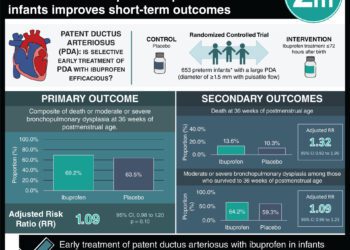Noninvasive respiratory support, methylxanthines among interventions that reduce re-intubations in preterm infants
1. In a meta-analysis of randomized studies evaluating efforts to reduce re-intubations and respiratory failure in preterm infants, non-invasive respiratory support and use of methylxanthines (theophylline, caffeine) were found to be beneficial.
2. Chest physiotherapy was also associated with lower risk extubation failure, but had adverse effects. Doxapram and corticosteroids did not have significant effect on extubation failure.
Evidence Rating Level: 1 (Excellent)
Study Rundown: Mechanical ventilation has been a life-sustaining intervention for respiratory complications of preterm infants. However, prolonged time on mechanical ventilation has been associated with neurologic injury, retinopathy of the newborn, bronchopulmonary dysplasia, and other complications. The goal of early extubation has led to development of interventions to improve post-extubation respiratory outcomes. These include non-invasive ventilation strategies, and pharmacologic therapies to increase respiratory drive or reduce inflammation. This study is a meta-analysis of randomized trials that evaluated strategies to improve successful extubation.
In evaluation of non-invasive ventilation strategies, the use of continuous positive airway pressure (CPAP) and nasal intermittent positive pressure ventilation (NIPPV) were superior to headbox oxygenation in preventing extubation failure. NIPPV or bi-level positive airway pressure were linked to lower rates of respiratory failure and reintubation compared to CPAP. Use of prophylactic methylxanthines was associated with lower rates of extubation failure. Corticosteroids and doxapram did not have any significant effects on extubation success. Chest physiotherapy was linked to lower rates of reintubation. The strength of this study included using a large number of studies that were of good quality. Limitations of the study include the heterogeneity amongst the original trials with regards to the different devices available commercially for non-invasive ventilation, which hampered direct comparisons. Additionally, the study used “respiratory failure” as an endpoint but the exact definition varied somewhat amongst the studies.
Click to read the study, published today in JAMA Pediatrics
Relevant Reading: A Trial Comparing Noninvasive Ventilation Strategies in Preterm Infants
In-Depth [meta-analysis]: This study was a meta-analysis of 50 studies pertaining to interventions to promote successful extubation of preterm infants. Studies were included if they were randomized trials published in English, and enrolled preterm (<37 weeks) infants. Exclusion criteria included intubation only for surfactant administration, or non-randomized trials. Primary outcomes included treatment failure (defined by the studies) and re-intubation within seven days.
The use of CPAP (RR 0.59; 95%CI 0.48-0.72) and NIPPV (RR 0.25; 95%CI 0.12-0.51) were associated with lower rates of respiratory failure compared to headbox oxygen. The use of any-mode of NIPPV or BiPAP compared to CPAP was associated with lower risk of re-intubation (RR 0.74; 95%CI 0.64-0.85) and respiratory failure (RR 0.70; 95%CI 0.60-0.81). Methylxanthines were linked to reduced rate of extubation failure (RR 0.48; 95%CI 0.32-0.71), but there was no significant difference between theophylline and caffeine. Chest physiotherapy was linked to lower rates of reintubation (RR 0.32; 95%CI 0.13-0.82). Corticosteroids and doxepram had no significant effect on extubation failure rates.
Image: CC/Flickr
©2016 2 Minute Medicine, Inc. All rights reserved. No works may be reproduced without expressed written consent from 2 Minute Medicine, Inc. Inquire about licensing here. No article should be construed as medical advice and is not intended as such by the authors or by 2 Minute Medicine, Inc.






